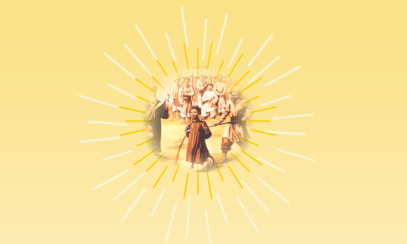
There’s More to St. Blase Than Candles
If it’s February in Michigan, chances are that you or someone you know has a sore throat. How handy then, that we Catholics have just the remedy. No, it’s not gargling with salt water, drinking tea with honey and lemon, or sucking on a zinc lozenge. It’s the traditional blessing of throats on the Feast of St. Blase, Feb. 3.
There’s something reassuring about feeling the smooth wax of the crossed candles against your throat and hearing the priest, deacon or lay minister say the familiar words: “By the intercession of St. Blase, bishop and martyr, may you be healed of all ailments of the throat and all other illnesses, in the name of the Father, the Son, and the Holy Spirit. Amen.”
St. Blase was the Henry Heimlich of his day, way back in the fourth century. He was a bishop in Sebaste, Armenia, but legend says that he was also a doctor. Once, a distraught mother came to St. Blase because her son was choking on a fish bone. Blase blessed the boy’s throat and the fish bone dissolved. The child’s life was saved. Later, when St. Blase was thrown into prison for being a Christian, the mother brought him food and candles.
But there’s more to St. Blase than fish bones and throat blessings. He’s also the patron saint of wild animals. Hundreds of years before St. Francis of Assisi tamed the wolf of Gubbio and chummed around with “sister bird” and “brother squirrel,” St. Blase hid from Roman authorities by living in a cave with wild animals. He was discovered and captured by hunters who witnessed the bishop curing sick and wounded animals who came to his cave for help. On his way to prison, St. Blase even talked a wolf into releasing a pig it had stolen from a poor woman.
St. Blase suffered martyrdom under the emperor Licinius around 316 A.D. He was starved, ripped with wool combs, and finally beheaded.
In the Middle Ages, St. Blase was venerated as one of the Fourteen Holy Helpers, a group of saints who were considered particularly effective as intercessors for certain groups of people or against certain illnesses and dangers. They include:
Saint – Intercedes For
St. Acacius: headaches
St. Barbara: fire, lightning
St. Blase: throat diseases
St. Catherine of Alexandria: students
St. Christopher: travelers
St. Cyriacus: eye diseases
St. Dionysius of Paris: headaches
St. Erasmus: sailors
St. Eustace: hunters
St. George: soldiers
St. Margaret of Antioch: women in childbirth
St. Pantaleon: miraculous cures
St. Vitus: epilepsy
St. Giles: people with disabilities



